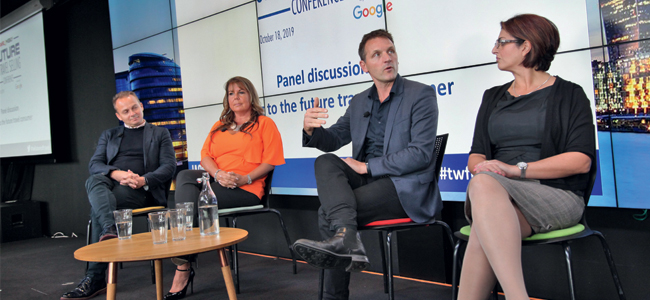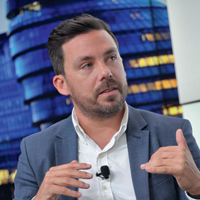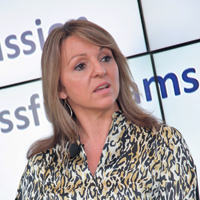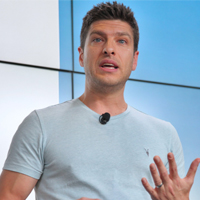Travel Weekly hosted its first full-day retail conference in London this month in partnership with Google. Lee Hayhurst and Ben Ireland report.
‘Allow good staff to go and sell travel industry benefits’
Travel companies should not be afraid to let good staff leave – as they can go on to work with firms in other parts of the industry or come back to businesses stronger.
A panel of experts discussing building teams accepted that employees may want to move on to further their careers and said new talent can be attracted by the perks of working in the industry.
Lee Haslett, Virgin Atlantic’s vice- president of sales for the UK and Europe, said: “Don’t be afraid to lose people. I had someone who left and I didn’t want to speak to them. But if they leave to better their career, you can bring them back.”
He cited one example where “we didn’t plan it but made sure he was a good leaver”, meaning the employee left on good terms.
‘Lateral moves’ were the new norm, he said, noting that secondments between Virgin Atlantic and partner airline Delta were common.
“The world of getting promoted from one role to the next has changed,” said Haslett, who recently moved from operator Virgin Holidays. “It’s not a ladder anymore.”
Abta education manager Vicki Wolf said ex-staff had gone on to work for Abta partners and members, which “helps with relationships, so is fantastic”. “We invest in training people,” she said. “There used to be a culture of ‘why train people if they’ll just move on?’ but [that’s changed].”
Travel can attract new talent by selling the industry’s benefits, said Holly Addison, principal at recruitment specialist Odgers Berndtson. She said: “When someone comes to interview, they’re assessing you as well. Give them an opportunity to look in the shop window. You can really steal a march because travel is a really fun, exciting industry.”
Google’s Stephanie Kovach said it was important for businesses to create a culture when recruiting and to look for soft skills such as ‘emotional’ and ‘adaptive’ intelligence.

‘Digital has a place, but you can’t replace human beings’
Emerging technology such as voice search and artificial intelligence is “light years” away from rivalling human travel agents, the Future of Travel Selling conference was told.
Giles Hawke, chief executive of Cosmos and Avalon Waterways, told delegates that consumers would always value the expertise of consultants, particularly for complex trips.
“Siri or Alexa is not going to help you book a holiday anytime soon as they don’t work. It’s light years away,” he said. “People lose interest in technology that doesn’t work.”
Hawke admitted he risked sounding like former Abta president and Bath Travel boss Stephen Bath, who two decades ago famously said he’d rather invest in new carpet for his stores than computers.
But he pointed to the emergence of trade bodies such as Clia, in cruise, and the Association of Touring & Adventure Suppliers (Atas), as evidence of a vibrant agency sector. “You only have to look at the growth of Clia and Atas, organisations that are committed to training travel agents on differentiated product that is hard to recreate yourself and needs expertise. That’s the future for tour operators and agents,” said Hawke.
Travel agents on the panel agreed. Kirsten Hughes, UK managing director of Travel Counsellors, said: “We can’t ignore tech. But tech doesn’t have empathy, humans do.
“It’s about putting tech in the hands of agents. When we created homeworking 25 years ago, people thought it was middle-aged women working in their bedrooms. But today it’s a fully-digitised platform that takes ‘pain’ away to enable our agents to sell.”
Julia Lo Bue-Said, chief executive of Advantage Travel Partnership, said there was a place for digital in travel but that it couldn’t replace talking to a human being.
But Andrew Shelton, managing director of Netflights, predicted technology like voice “will come”, particularly for straight-forward requests. “The problem with voice is just that people don’t know what question to ask,” he said.
Flexible working can help generate ‘phenomental’ results
Offering flexible working and allowing staff to make mistakes can produce “phenomenal” results for businesses, a panel on team building concluded.

Lee Haslett, Virgin Atlantic’s vice-president of sales for the UK and Europe, said: “If you don’t embrace flexible working, you are missing out on some very talented people.
“I’ve had many people who have moved, or their circumstances have changed – when you provide flexible working, what you get in return is phenomenal.” But he added: “You have to manage them like one big office.”
Holly Addison, of recruitment firm Odgers Berndtson, agreed, but said it was important to avoid encouraging an “always on” mantra among remote staff to avoid burnout.
Google’s Stephanie Kovach said creating a positive working environment was crucial to nurturing creativity and said “to be able to come to work and bring your full self” encourages “creativity and imagination”.
Abta’s Vicki Wolf said flexible working practices helped reduce the onset of mental health issues. “The main thing is communication and open conversations with managers,” she said. “It helps managers understand pressures, especially with younger people.”
Firms have a ‘long way to go’ in appointing female leaders
A recruitment specialist says there is a long way to go for many firms when recruiting females for senior leadership roles.
 Holly Addison of recruitment specialist Odgers Berndtson pointed to a recent news story that showed there were more chief executives called Steve than there were female CEOs in the FTSE 100.
Holly Addison of recruitment specialist Odgers Berndtson pointed to a recent news story that showed there were more chief executives called Steve than there were female CEOs in the FTSE 100.
She said she had seen a company hiring for a senior role list each candidate’s childcare commitments when assessing the best person for the job.
“It’s disappointing how much I hear that they have to be visible all of the time,” she said.
Addison said to “break through the glass ceiling”, many senior females had told her they had relied on mentors.
“Mentorship has helped, whether it’s formal or not,” she said. “But there is still an awful lot more to do in this space.”
Google finds ‘challengers’ can break brand loyalty
Brand loyalty in travel can be broken simply by ‘challenger brands’ making noises in the market, exclusive Google research suggests.
Google analysed 300 behavioural traits and used seven to filter search results in online travel sales of hotel and package holidays.
It pitched a pretend brand, Caliente Getaways, against the two favourite package travel brands of 1,000 shoppers to see which metrics made them shift to the challenger.
 They included freebies such as extra room nights, notes saying ‘book now’ or ‘selling fast’, and social norms like holidays being billed as the ‘most popular’.
They included freebies such as extra room nights, notes saying ‘book now’ or ‘selling fast’, and social norms like holidays being billed as the ‘most popular’.
It found 34.3% of shoppers moved to their second-favourite brand merely by its introduction, while 87.7% moved when all seven factors were added.
Caliente Getaways attracted 75% of shoppers to switch when all seven metrics were applied.
Google research lead Alistair Rennie said: “It’s a pretty good proxy for a challenger brand in the real world.”
